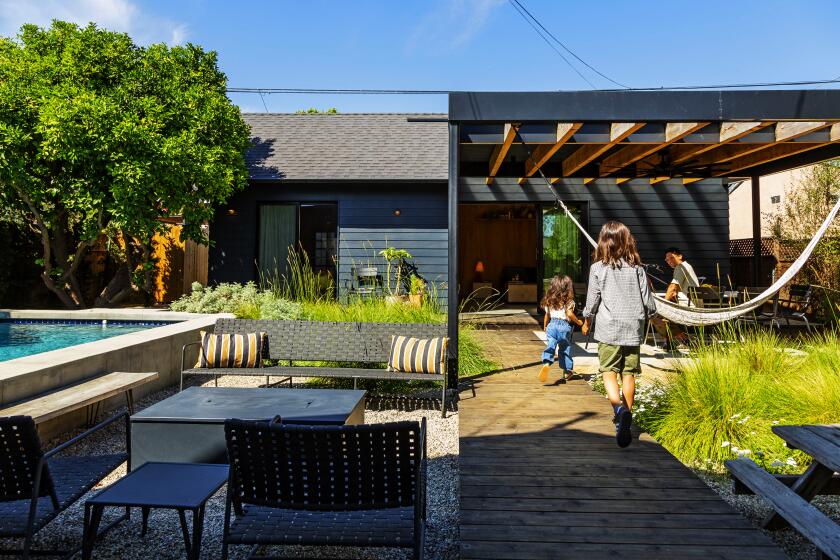Juilliard Quartet Shows Founder’s Vitality
- Share via
One was fully prepared to say farewell to the Juilliard String Quartet on Saturday night at Schoenberg Hall at UCLA when it gave its last concert in California with Robert Mann in the first violin chair.
Mann, who will leave the ensemble in June, has lasted far longer than anyone rightfully could have expected. He formed the Juilliard Quartet in 1946 when, as a young violinist recently back from the war and teaching at the Juilliard School, he realized that America needed a good string quartet a lot more than it needed a congratulatory five-cent cigar.
It was the time for Americans to show that they could become a cultural superpower, just as the country had become a military and political one. And a string quartet--which always had represented European high art in its most sophisticated and rarefied form--was just the audacious vehicle with which to do it.
With its raw, urban energy, its progressive spirit and its willingness to try just about anything, the Juilliard brought in a new era of string quartet playing. It exhibited a degree of excitement and drama that chamber music had never known. Its repertoire--new or old music, American or European music--didn’t really matter because the quartet played all music as if it just had been picked off the streets of New York.
*
But time takes its toll on any violinist, and certainly will take its toll on one as brilliantly reckless as Mann, who has continued to head the quartet through the years and through changing memberships.
The quartet never lost its intensity and has continued to grow in musical depth, but as the edges became rougher and rougher, the intonation worse and worse, many of its most ardent admirers had preferred in recent years to remember it as it is on its classic older recordings.
The intonation Saturday was not always perfect. But then Mann reportedly was overheard backstage at a concert in New York a few weeks ago joking that he has never played in tune. And maybe he hasn’t. He didn’t have to. There were other, more important things. There still are.
In fact, there was no need for apology or condescension Saturday. It was a magnificent concert. Haydn, Bartok and Beethoven were on the program, and it is hard to remember now, but it was the Juilliard that had a great deal to do with making all three of these composers mean what they do to us today, by framing a modern approach to them.
Before the Juilliard, there never had been the appreciation of the sheer theatricality of Haydn’s string quartets. Bartok’s quartets, still new, were practically unknown until the Juilliard played the first American cycle of them in 1947. Beethoven quartets were, of course, a staple, but they had never been cooked the way the Juilliard did them.
On this occasion, the Juilliard was very much itself in Haydn’s Op. 50, No. 3, the fifth Bartok quartet, and Beethoven’s sublime late quartet, Op. 132. It always has been a trait of the Juilliard, throughout its changing membership, that each player maintains his personality. Leader though Mann may be, second violinist Joel Smirnoff, violist Samuel Rhodes and cellist Joel Krosnick always were in there, aggressively asserting themselves and bringing new insights to the familiar scores.
In Haydn, that meant startling dramatic turns that seemed so fresh, even the players themselves were taken off guard, still not sure what to expect from one another after all these years. The Bartok and Beethoven cannot remain quite so new, since the quartet has played these pieces hundreds if not thousands of times. But that only seemed to make the Bartok more swaggering than ever, and the Beethoven more profound.
*
The slow movement of Op. 132 contains some of the most amazing music Beethoven ever wrote, in its alternation of an exalted slow, spiritual hymn with a section of music that recovers vigor and ultimately becomes wildly visionary. Beethoven was recovering from a serious illness, profoundly aware of mortality one moment, then defiant the next, as only he could be.
That seemed exactly the state of the Juilliard as well. The hymn section swelled with indescribable intensity. The contrasting section--”feeling a new power,” Beethoven writes in the score--was astonishing in its dramatic vitality, in the way the Juilliard still can make this sound like the latest new music.
Mann will play his last concert with the Juilliard in June at Tanglewood; in August the quartet will be reborn with Smirnoff as first violinist and Ronald Copes (a former member of the Los Angeles Piano Quartet who is on the faculty at UC Santa Barbara) as the new second violinist. There clearly is a spirit here that is nowhere near dying.
More to Read
The biggest entertainment stories
Get our big stories about Hollywood, film, television, music, arts, culture and more right in your inbox as soon as they publish.
You may occasionally receive promotional content from the Los Angeles Times.











